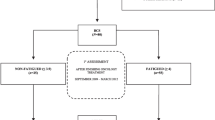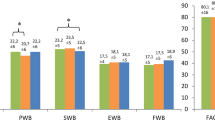Abstract
Purpose
The aims of this study were to evaluate the health status of long-term breast cancer survivors (LTBCS) suffering from higher levels of fatigue, to highlight their needs, and to establish the key points of intervention support programs.
Methods
A cross-sectional observational study was conducted at the Sport and Health Joint University Institute (iMUDS) between September 2016 and July 2017 with 80 LTBCS that were classified into non-fatigued (≤ 3.9) or fatigued (≥ 4) according to the Piper Fatigue Scale (PFS) total score. The instruments used were the European Organization for Research and Treatment of Cancer Core 30 and its breast cancer (BC) module, the Visual Analog Scale (VAS), the Brief Pain Inventory (BPI), the Scale for Mood Assessment (EVEA), the International Fitness Scale (IFIS), and the Charlson Comorbidity Index.
Results
The analysis revealed that 41.2% of LTBCS were considered moderately fatigued and showed significantly higher levels for the categories of “nausea and vomiting” (P = .005), “pain,” “dyspnea” and “insomnia” (P < .001), “appetite loss” (P = .002), “financial difficulties” (P = .010), “systemic therapy side effects” (P < .001), “breast symptoms” and “arm symptoms” (P = .002), and “upset by hair loss” (P = .016). In addition, LTBCS presented significantly higher levels of pain in the affected and non-affected arm, “sadness-depression.” “anxiety,” “anger/hostility” (All: P < .001), and lower general physical fitness (P < .001). The rest of the variables did not show significant differences.
Conclusion
LTBCS suffering from higher levels of fatigue had lower QoL, higher level of pain, worse mood state, and lower physical fitness.

Similar content being viewed by others
References
Bodai BI, Tuso P (2015) Breast cancer survivorship: a comprehensive review of long-term medical issues and lifestyle recommendations. Perm J 19(2):48–79. https://doi.org/10.7812/tpp/14-241
Lebel S, Rosberger Z, Edgar L, Devins GM (2008) Predicting stress-related problems in long-term breast cancer survivors. J Psychosom Res 65(6):513–523. https://doi.org/10.1016/j.jpsychores.2008.07.018
Hofman M, Ryan JL, Figueroa-Moseley CD, Jean-Pierre P, Morrow GR (2007) Cancer-related fatigue: the scale of the problem. Oncologist 12(Supplement 1):4–10
Lee B-N, Dantzer R, Langley KE, Bennett GJ, Dougherty PM, Dunn AJ, Meyers CA, Miller AH, Payne R, Reuben JM (2004) A cytokine-based neuroimmunologic mechanism of cancer-related symptoms. Neuroimmunomodulation 11(5):279–292
Ryan JL, Carroll JK, Ryan EP, Mustian KM, Fiscella K, Morrow GR (2007) Mechanisms of cancer-related fatigue. Oncologist 12(Supplement 1):22–34
Dimeo F, Stieglitz RD, Novelli-Fischer U, Fetscher S, Mertelsmann R, Keul J (1997) Correlation between physical performance and fatigue in cancer patients. Ann Oncol 8(12):1251–1255. https://doi.org/10.1023/A:1008234310474
Kober KM, Smoot B, Paul SM, Cooper BA, Levine JD, Miaskowski C (2016) Polymorphisms in cytokine genes are associated with higher levels of fatigue and lower levels of energy in women after breast cancer surgery. J Pain Symptom Manag 52(5):695–708. e694
Schmidt ME, Semik J, Habermann N, Wiskemann J, Ulrich CM, Steindorf K (2016) Cancer-related fatigue shows a stable association with diurnal cortisol dysregulation in breast cancer patients. Brain Behav Immun 52:98–105
LaVoy EC, Fagundes CP, Dantzer R (2016) Exercise, inflammation, and fatigue in cancer survivors. Exerc Immunol Rev 22:82
Schmidt ME, Chang-Claude J, Vrieling A, Heinz J, Flesch-Janys D, Steindorf K (2012) Fatigue and quality of life in breast cancer survivors: temporal courses and long-term pattern. J Cancer Surviv 6(1):11–19
Romito F, Cormio C, Giotta F, Colucci G, Mattioli V (2012) Quality of life, fatigue and depression in Italian long-term breast cancer survivors. Support Care Cancer 20(11):2941–2948
Romito F, Montanaro R, Corvasce C, Di Bisceglie M, Mattioli V (2008) Is cancer-related fatigue more strongly correlated to haematological or to psychological factors in cancer patients? Support Care Cancer 16(8):943–946
Bower JE, Ganz PA, Desmond KA, Bernaards C, Rowland JH, Meyerowitz BE, Belin TR (2006) Fatigue in long-term breast carcinoma survivors: a longitudinal investigation. Cancer 106(4):751–758. https://doi.org/10.1002/cncr.21671
Schmidt ME, Chang-Claude J, Seibold P, Vrieling A, Heinz J, Flesch-Janys D, Steindorf K (2015) Determinants of long-term fatigue in breast cancer survivors: results of a prospective patient cohort study. Psycho-Oncology 24(1):40–46
Reinertsen KV, Cvancarova M, Loge JH, Edvardsen H, Wist E, Fosså SD (2010) Predictors and course of chronic fatigue in long-term breast cancer survivors. J Cancer Surviv 4(4):405–414
Carlsen K, Jensen AJ, Rugulies R, Christensen J, Bidstrup PE, Johansen C, Huitfeldt Madsen IE, Dalton SO (2013) Self-reported work ability in long-term breast cancer survivors. A population-based questionnaire study in Denmark. Acta Oncol 52(2):423–429
Cantarero-Villanueva I, Fernandez-Lao C, Fernandez DEL-PC, Diaz-Rodriguez L, Sanchez-Cantalejo E, Arroyo-Morales M (2011) Associations among musculoskeletal impairments, depression, body image and fatigue in breast cancer survivors within the first year after treatment. Eur J Cancer Care 20(5):632–639. https://doi.org/10.1111/j.1365-2354.2011.01245.x
Piper BF, Dibble SL, Dodd MJ, Weiss MC, Slaughter RE, Paul SM (1998) The revised Piper Fatigue Scale: psychometric evaluation in women with breast cancer. Oncol Nurs Forum 4:677–684
O’Regan P, Hegarty J (2017) The importance of self-care for fatigue amongst patients undergoing chemotherapy for primary cancer. Eur J Oncol Nurs 28:47–55
Chang YJ, Lee JS, Lee CG, Lee WS, Lee KS, Bang S-M, Wang XS, Mendoza TR, Cleeland CS, Yun YH (2007) Assessment of clinical relevant fatigue level in cancer. Support Care Cancer 15(7):891–896
Law 14/2007, of July 3, on Biomedical Research. Official Bulletin of the State, No 159, BOE-A-2007-12945 (Jun 2, 2011)
Cantarero-Villanueva I, Fernández-Lao C, Díaz-Rodríguez L, Cuesta-Vargas AI, Fernández-de-las-Peñas C, Piper BF, Arroyo-Morales M (2014) The Piper fatigue scale-revised: translation and psychometric evaluation in Spanish-speaking breast cancer survivors. Qual Life Res 23(1):271–276
Zawisza K, Tobiasz-Adamczyk B, Nowak W, Kulig J, Jędrys J (2010) Validity and reliability of the quality of life questionnaire (EORTC QLQ C30) and its breast cancer module (EORTC QLQ BR23). Ginekol Pol 81(4)
Sprangers M, Groenvold M, Arraras JI, Franklin J, te Velde A, Muller M, Franzini L, Williams A, De Haes H, Hopwood P (1996) The European Organization for Research and Treatment of Cancer breast cancer-specific quality-of-life questionnaire module: first results from a three-country field study. J Clin Oncol 14(10):2756–2768
Bijur PE, Silver W, Gallagher EJ (2001) Reliability of the visual analog scale for measurement of acute pain. Acad Emerg Med 8(12):1153–1157
Badia X, Muriel C, Gracia A, Nunez-Olarte J, Perulero N, Galvez R, Carulla J, Cleeland C (2003) Validation of the Spanish version of the Brief Pain Inventory in patients with oncological pain. Med Clin 120(2):52–59
Sanz J (2001) Un instrumento para evaluar la eficacia de los procedimientos de inducción de estado de ánimo:“La Escala de Valoración del Estado de Ánimo”(EVEA). Análisis y Modificación de Conducta 27(111):71–110
Español-Moya MN, Ramírez-Vélez R (2014) Psychometric validation of the International FItness Scale (IFIS) in Colombian youth. Rev Esp de Salud Publica 88(2):271–278
Katz JN, Chang LC, Sangha O, Fossel AH, Bates DW (1996) Can comorbidity be measured by questionnaire rather than medical record review? Med Care 34(1):73–84
Cohen J (1977) Statistical power analysis for the behavioural sciences. Academic, New York
Bower JE, Ganz PA, Desmond KA, Rowland JH, Meyerowitz BE, Belin TR (2000) Fatigue in breast cancer survivors: occurrence, correlates, and impact on quality of life. J Clin Oncol 18(4):743–743
Meeske K, Smith AW, Alfano CM, McGregor BA, McTiernan A, Baumgartner KB, Malone KE, Reeve BB, Ballard-Barbash R, Bernstein L (2007) Fatigue in breast cancer survivors two to five years post diagnosis: a HEAL Study report. Qual Life Res 16(6):947–960
Falk Dahl CA, Reinertsen KV, Nesvold IL, Fosså SD, Dahl AA (2010) A study of body image in long-term breast cancer survivors. Cancer 116(15):3549–3557
Arraras JI, Illarramendi JJ, Salgado E, de la Cruz S, Asin G, Manterola A, Ibañez B, Zarandona U, Dominguez MA, Vera R (2016) An evaluation study of the determinants of future perspective and global Quality of Life in Spanish long-term premenopausal early-stage breast cancer survivors. Contemp Oncol 20(2):165–170
Kim SH, Son BH, Hwang SY, Han W, Yang J-H, Lee S, Yun YH (2008) Fatigue and depression in disease-free breast cancer survivors: prevalence, correlates, and association with quality of life. J Pain Symptom Manag 35(6):644–655
Bower JE (2014) Cancer-related fatigue--mechanisms, risk factors, and treatments. Nat Rev Clin Oncol 11(10):597–609. https://doi.org/10.1038/nrclinonc.2014.127
Laird BJ, Scott AC, Colvin LA, McKeon A-L, Murray GD, Fearon KC, Fallon MT (2011) Pain, depression, and fatigue as a symptom cluster in advanced cancer. J Pain Symptom Manag 42(1):1–11
Schubert C, Hong S, Natarajan L, Mills PJ, Dimsdale JE (2007) The association between fatigue and inflammatory marker levels in cancer patients: a quantitative review. Brain Behav Immun 21(4):413–427. https://doi.org/10.1016/j.bbi.2006.11.004
Collado-Hidalgo A, Bower JE, Ganz PA, Cole SW, Irwin MR (2006) Inflammatory biomarkers for persistent fatigue in breast cancer survivors. Clin Cancer Res 12(9):2759–2766. https://doi.org/10.1158/1078-0432.ccr-05-2398
Liu L, Mills PJ, Rissling M, Fiorentino L, Natarajan L, Dimsdale JE, Sadler GR, Parker BA, Ancoli-Israel S (2012) Fatigue and sleep quality are associated with changes in inflammatory markers in breast cancer patients undergoing chemotherapy. Brain Behav Immun 26(5):706–713. https://doi.org/10.1016/j.bbi.2012.02.001
Resnick HE, Carter EA, Aloia M, Phillips B (2006) Cross-sectional relationship of reported fatigue to obesity, diet, and physical activity: results from the third national health and nutrition examination survey. J Clin Sleep Med 2(2):163–169
Bouchard C (ed) (2000) Physical activity and obesity. Human Kinetics Press, Champaign
Mason C, Alfano CM, Smith AW, Wang C-Y, Neuhouser ML, Duggan C, Bernstein L, Baumgartner KB, Baumgartner RN, Ballard-Barbash R, McTiernan A (2013) Long-term physical activity trends in breast cancer survivors. Cancer Epidemiol Biomarkers Prev 22(6):1153–1161
Mutrie N, Campbell A, Barry S, Hefferon K, McConnachie A, Ritchie D, Tovey S (2012) Five-year follow-up of participants in a randomised controlled trial showing benefits from exercise for breast cancer survivors during adjuvant treatment. Are there lasting effects? J Cancer Surviv 6(4):420–430. https://doi.org/10.1007/s11764-012-0233-y
Horneber M, Fischer I, Dimeo F, Ruffer JU, Weis J (2012) Cancer-related fatigue: epidemiology, pathogenesis, diagnosis, and treatment. Dtsch Arztebl Int 109(9):161–171; quiz 172. https://doi.org/10.3238/arztebl.2012.0161
Woo HK, Park JH, Kang HS, Kim SY, Lee SI, Nam HH (2010) Charlson Comorbidity Index as a predictor of long-term survival after surgery for breast cancer: a Nationwide Retrospective Cohort Study in South Korea. J Breast Cancer 13(4):409–417
Acknowledgements
The authors thank all individuals who participated in this study. We are also grateful to Ms. Carmen Sainz-Quinn for assistance with the English language. This study takes place thanks to the additional funding from the University of Granada, Plan Propio de Investigación 2016. Excellence actions: Units of Excellence; Scientific Excellence Unit on Exercise and Health (UCEES).
Author information
Authors and Affiliations
Corresponding author
Ethics declarations
Conflict of interests
The authors declare that they have no conflict of interest.
Ethical approval
All procedures performed in studies involving human participants were in accordance with the ethical standards of the institutional and/or national research committee and with the 1964 Helsinki declaration and its later amendments or comparable ethical standards. Ethical approval for the study was granted by the Biomedical Research Ethical Committee of Granada (1038-N-16 I.P) and the study followed the Helsinki Declaration for biomedical research (14/2017).
Informed consent
Informed consent was obtained from all the individual participants included in this study.
Rights and permissions
About this article
Cite this article
Álvarez-Salvago, F., Galiano-Castillo, N., Arroyo-Morales, M. et al. Health status among long-term breast cancer survivors suffering from higher levels of fatigue: a cross-sectional study. Support Care Cancer 26, 3649–3658 (2018). https://doi.org/10.1007/s00520-018-4240-z
Received:
Accepted:
Published:
Issue Date:
DOI: https://doi.org/10.1007/s00520-018-4240-z




